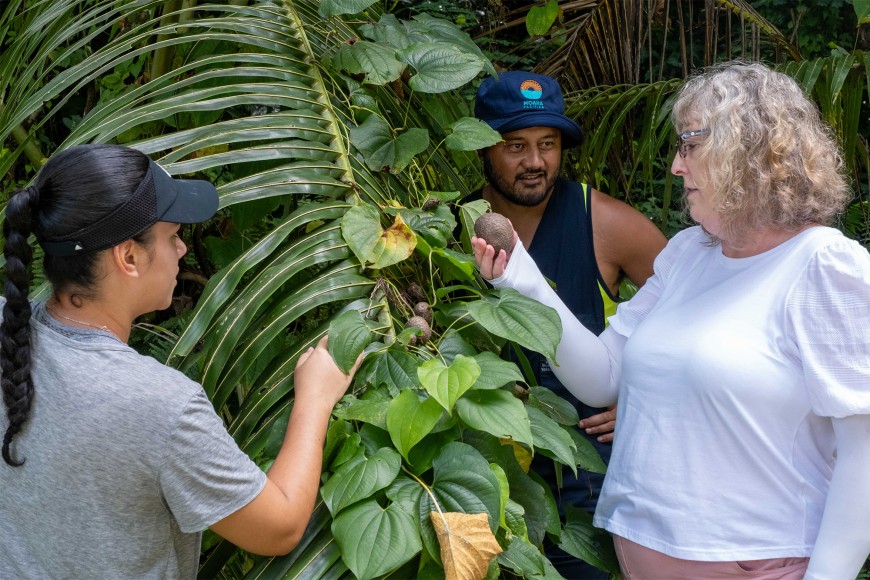![Air potato leaf beetle [Lilioceris cheni] Air potato leaf beetle [Lilioceris cheni]](/assets/Publications/Putaiao/putaiao-issue-18/sq-Air-potato-leaf-beetle-Lilioceris-cheni__ResizedImageWzQwNSw0MDVd.jpg)
Air potato leaf beetle [Lilioceris cheni]
In Tuvalu, stakeholders at a prioritisation workshop wanted to find better ways to control tamalini or leucaena (Leucaena leucocephela). In the Marshall Islands chromolaena (Chromolaena odorata) is a serious issue, while in Niue farmers are struggling to hold back the invasive air potato (Dioscoria bulbifera).
In April, the NENS team headed to Tuvalu with the island nation’s first ever natural enemy – a colony of leaf-feeding psyllids, Heteropsylla cubana, which will be used to control the leucaena.
NENS Programme leader Lynley Hayes says the team worked with Tuvalu’s National Invasive Species co-ordinator Sam Panapa to release the psyllid – a tiny insect that can rapidly kill seedlings of susceptible leucaena plants, at suitable sites.
Sam underlined the importance of the NENS project through the help it provides Tuvalu to identify invasive weeds and promote the use of natural enemies. “This method is safer than using chemicals, as they do not harm other desirable species or cause other unwanted issues.”
Manaaki Whenua collaborated with Biosecurity Queensland in Australia to release a gall fly to combat the spread of chromolaena on Bikini Atoll in the Marshall Islands. The Chief of Quarantine in the Marshall Islands, Ms Silver Wase, says chromoleana outcompetes preferred grasses in grazing pastures, and affects the establishment of bananas, papaya and cocoa trees.
“It was agreed then that natural enemies should be considered for use against the largest known infestation of chromolaena in the country, which is on Bikini Atoll,” says Ms Wase.
Michael Day, Principal Entomologist (Honorary) Biosecurity Queensland undertook the long journey - three flights and a 4-day boat trip – with a colony of gall flies in his carry-on. The flies were bred by Biosecurity Queensland, which released the fly in Australia in 2018 in its efforts to control the smothering plant. New Zealand is fortunate to be free of this weed.

NENS programme lead Lynley Hayes inspects an air potato vine (Dioscoria bulbifera) that is weighing down a palm tree in Niue with National Invasive Species Co-ordinator Huggard Tongatule and colleague Shiloh Pasisi.
Australia and New Zealand have been collaborating in the field of weed biological control since the 1930s, which saves costs by not having to reinvent the wheel in terms of the research, funding and testing of agents.
While in Niue, the team surveyed potential release sites for the air potato leaf beetle (Lilioceris cheni), a natural enemy of the air potato. Colonies of the beetle will be taken to Niue in October.
